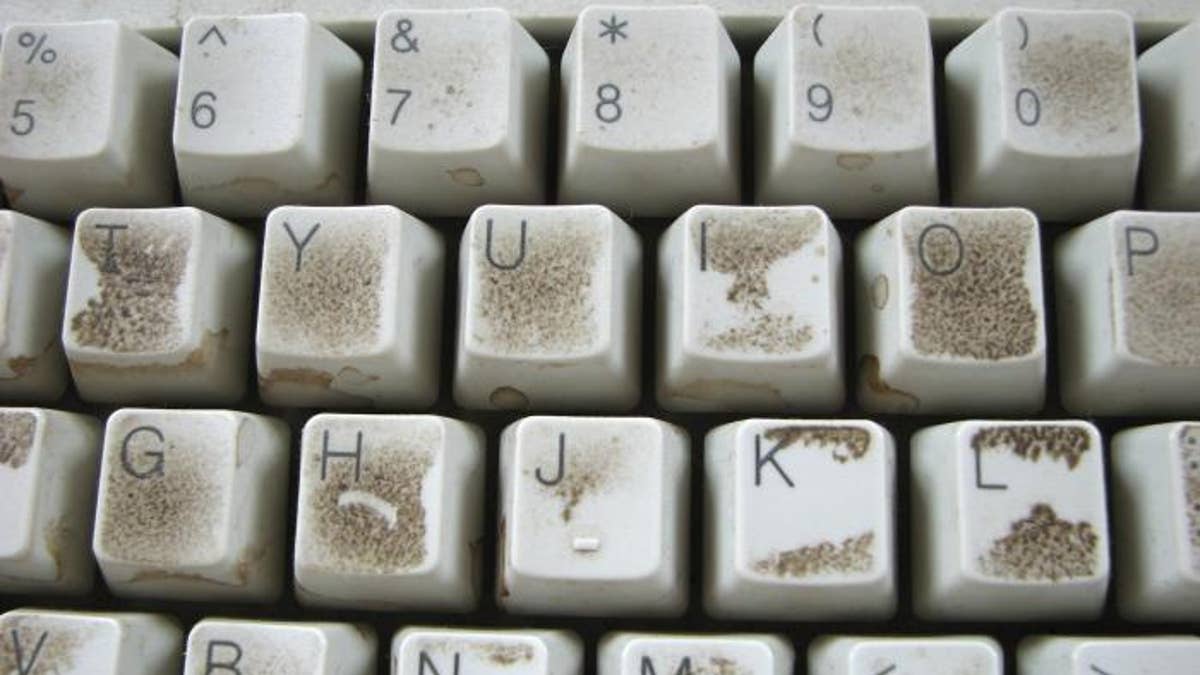
You clean your computer keyboard regularly, right? Give it a good wipe-down after a long day of typing? With an alcohol-based solution of some kind?
No? You don't? Really?
That's not surprising, actually. Just like our and our keyboards probably don't get enough love from the disinfectant canister.
"You know, I think people just don’t clean them often," states Dr. Phyllis Della-Latta, a professor of clinical pathology and the director of the clinical microbiology service at the Columbia University Medical Center. "Whatever it is that you’re touching or handling is going to end up on that keyboard, just like anything else," she says. "You could introduce pathogens."
And if you share that keyboard with co-workers, roommates, children, or pretty much anyone else, you're accumulating their germs too. "It's an extra variable," says Della-Latta.
This is especially true in certain workplaces, like medical offices or classrooms. Where Dr. Della-Latta works, for instance, the keyboards are covered with a protective plastic cover and they're cleaned twice daily. "Anyplace, like in a hospital or health care center, would have to do that," she says. As for classrooms, that's a different story.
One study conducted by hygiene expert Dr. Charles P. Gerba found that schoolteachers' keyboards contained far and away the most germs of any profession studied, possibly due to "constant teacher contact with children or children’s interaction with surrounding surfaces." All other occupations evaluated didn't even come close, perhaps because the nature of their work doesn't risk so many extra hands in the same vicinity as the keys.
Plus, a separate study conducted by Gerba and Sheri L. Maxwell, BS, found that keyboards in home offices (and home offices in general) contain more bacteria than their work counterparts. "The home office is germier than the work office," they conclude. This fact, however, may be attributed to the higher percentage of work offices that reported using a disinfectant on a regular basis (34 percent), rather than home offices, which were infrequently disinfected (12 percent).
That only hammers home the point Della-Latta made above. "You just have to be clean about it," reiterates Della-Latta. "If you look at something and it looks dirty, it’s dirty."
But even if something doesn't appear to be visibly filthy with grime of food crumbs ("Bacteria love that stuff," says Della-Latta), that doesn't mean it can't be crawling with pathogens. "If you're sick, you may not see the mucous [you produce]," she notes, "but you know it's on your hands." So if you've been sneezing, coughing or wheezing (or you know someone in your home who is), there's a good chance those germs will end up on your computer.
"Mucous contains cells where respiratory viruses can grow," Della-Latta continues. "But the viruses, thankfully, don't last all that long," she states. "They need cells to stay alive," and the amount of cells on your keys is directly related to how much mucous has accumulated.
If, by some odd chance, you haven't yet doused your keyboard in gasoline and set it ablaze, don't. "Keyboards are nice and easy to clean," says Della-Latta. In addition to compressed air dusters that remove crumbs and debris, she recommends using a cloth with soapy water (not overly saturated) and wiping it along the keys. "Or even [use] some alcohol on the cloth," she says, "but nothing caustic" that could wear away at the electronics.
"And cover your keyboard at night," she suggests.
Of course, preventing the spread of germs starts with keeping your hands clean. "That’s the majority of the ways in which we transport pathogens," says the expert, who urges that you carry some Purell and clean your hands often. "People underestimate soap and water," says Della-Latta.
And as you've just learned, people also underestimate the amount of filth on their keyboards. So maybe take a moment to wipe down your electronic hardware before you click away from this page.
By the way, you regularly disinfect that mouse, right?








































